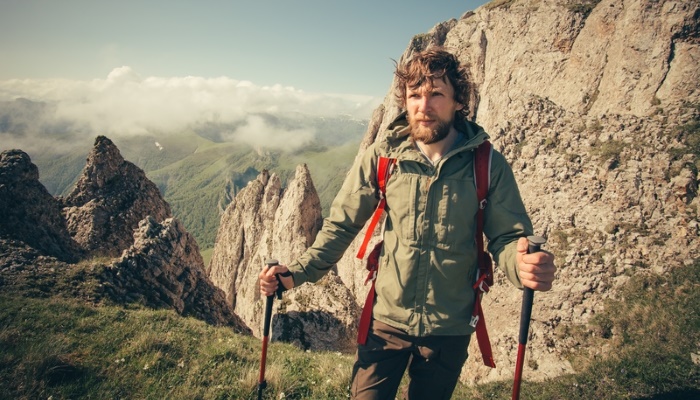Alpha males need to know how to handle themselves outdoors. And if you don’t have any survival skills out in the wild, you’re really not an alpha male at all – sorry.
The good news is that there are eight critical skills that you can quickly master in a few weekends. If you don´t think you’re an alpha male, you’ll get on the right path by learning these techniques.
Skill #8 – Making a Split-Tip Gig for Hunting & Defense
A split-tip gig is meant for hunting and self-defense. And the first step is to find a sapling that is about one inch in diameter (cut off all of the branches). The sapling should be 6 – 8 feet in length.
Using a knife of stone cut down the middle of the sapling (from the top) about 10 inches deep. Rotate the sapling and do it again. You should have four pieces at this point. Place two branches between the ends (one horizontal and one vertical). You need to do this to keep the tines apart.
Now, using a knife or stone, make all of the tips sharp. What this allows is for a four-point weapon that can be used to spear fish.
Keep in mind: You can also use vines to lash the end of the weapon to stop them from splintering and breaking.
Skill #7 – Navigating by Day & Night
The sun and moon allow you to navigate without a compass. We’ll start with the sun first.
Sun Navigation:
- Finding north with the sun requires a 3-foot long stick.
- Jab this stick in the ground and see where the shadow lays.
- Use a stone to mark the first point.
- Wait 15 minutes and use another stone to map the second point.
- Stand with the first mark on your left and the second mark on your right.
- Look forward and you’re looking north.
Night Navigation:
You can choose not to navigate at night, or you can use the stars.
Skill #6 – Finding Survival Food in Nature
Nature provides a lot of edible foods, but they might not taste like mom’s home cooking. A few ways to find foods are:
- You can eat grass and most plants. Very few types of grass have toxic seeds. Stay away from black or purple seeds.
- Acorns can be eaten and contain a good amount of protein and fats.
- Pine can be eaten. Pine nuts are also able to be safely eaten.
- Sunflower seeds are a tasty treat as well.
Keep in mind: Seeds are an excellent food source, but you need to be very cautious when eating out in the wild for fear of eating poisonous foods.
Skill #5 – Locating Water Source & Its Purification
Water purifiers are recommended if you’re out in the wild, but you’ll need to find water first. You can apparently listen for a stream or river, but lakes may also be a water source.
The issue is that standing water becomes filled with bacteria. But if you have nothing else to drink, you’ll have no other option.
Here are a few tips:
- Bees stay within 3 to 4 miles of fresh water.
- Ants require water that they often find it in tree trunks.
- Dew can be collected.
Skill #4 – (Survivalist) Basic First Aid
Basic first aid skills are a necessity. If aloe vera grows in the area, you can use this for burns and cuts. Otherwise, you’ll need to learn how to:
- Make a splint using sticks to keep a bone in place.
- Use vines to make a tourniquet to cut off circulation to a massive wound.
- Apply pressure to bleeding wounds to cause clotting.
Keep in mind: Cuts and scrapes are the most common injuries in the wild, but bone breaks are common as well.
Skill #3 – Making & Maintaining a Fire
You need to know how to make and maintain a fire. And you want to be able to do it without matches or a lighter – it’s not easy. A bow and drill is the hard method, but you can also use a flint or Firestarter to make life easier.
First, you’ll need to choose your wood (make sure it is dry and dead). I recommend choosing one of these: Basswood, Cedar, Cottonwood, Willow, Aspen, and Buckeye.
And collect a lot of branches that are two feet long and somewhat thick – approximately the size of your wrist in thickness. You’ll need four components:
- Board – You need a foot-long board that is about three inches wide.
- Spindle – A foot-long piece of wood that needs to be about an inch thick. A sharp end point needs to be made, and this can be done by rubbing the spindle on a rock.
- Handhold – A piece of wood to go on top of the spindle.
- Bow – Place a string on a branch and make it into a bow.
Now, you’ll put the board on the bottom, followed by the spindle in the middle and the handhold on top. The bow will be used to move the spindle back and forth to create friction and an eventual fire.
Pay attention: Maintaining requires dry tinder and wood. Shredded woods work very well, too.
Skill #2 – Building Primitive Shelter
Your shelter is essential, but you won’t be spending the night at the Ritz hotel. Open shelters are easiest, and you can make walls to turn these into mini tents.
You can do this by:
- Grabbing several long branches (3 – 4 feet) and tying them together using vines.
- Covering these branches in crotches (branches, leaves or anything that can provide wind blockage). Ideally, you’ll use pine-needle branches that can be weaved into your frame.
- Between two trees, tie the “wall” from the first step on a slant.
You can also make posts by drilling long branches into the ground. Now, you’ll repeat the process, and slide into your covering at night. It’s not pretty, but it works.
Skill #1 – Adopting Survival Attitude & Mentality
Life today is a lot easier than in the past. You’ll need to remember the rule of three above all else. This rule states that humans can survive for:
- 3 Minutes without air.
- 3 Hours without shelter (unregulated body temperature).
- 3 Days without water.
- 3 Weeks without food.
When you’re out in the wild, you’ll also need to remember S.P.E.A.R. This means S-top, P-lan, E-xecute, A-ssess, and Re-evaluate.
Pay attention: If you follow any rules in the wild, these are the two you need to remember the most.











